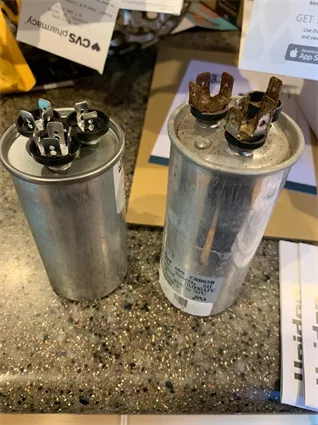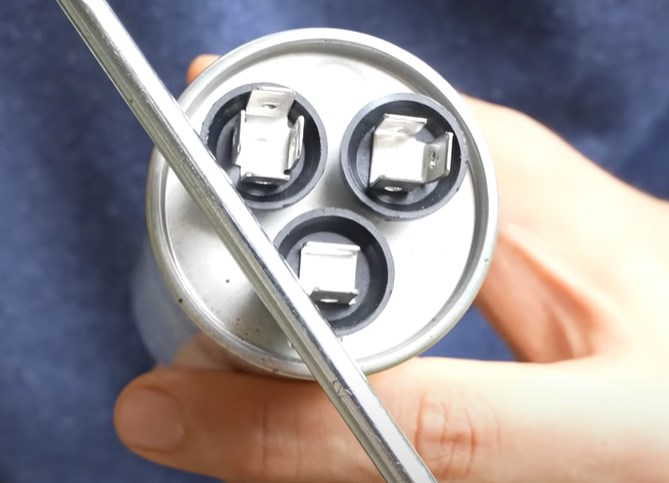OUTLINE:
How Do I Know If My AC Capacitor Is Bad: Solutions
 119
119In the world of air conditioning, the capacitor plays a crucial role. But how can you know if your AC capacitor is going bad? This guide will walk you through everything you need to know, from the signs of a bad AC capacitor to what to do if it's faulty.

Understanding the Role of an AC Capacitor
The AC capacitor is a key component in your air conditioning system. Before we dive into the signs of a bad capacitor, let's first understand its role.
What is an AC Capacitor
An AC capacitor is a small cylindrical device inside your air conditioning unit that stores and supplies energy to the motors that power the compressor and fans.
How Does an AC Capacitor Work
The AC capacitor works like a battery. It charges up when the system is on, and releases its stored energy to help the motors start and run efficiently
How to Know If Your AC Capacitor is Bad
For most capacitors, there are 4 types of capacitor damage: short circuit, no capacitance, reduced capacitance, and poor stability. It is indeed difficult to determine the condition of a capacitor in a circuit. In practical operations, the condition of capacitors that experience breakdown, leakage, or poor stability is often judged by their external appearance or temperature rise. Sometimes, voltage measurement during power-on is also used for confirmation. For open-circuit large capacitors, they are generally tested by analyzing the fault symptoms and circuit before being suspected and removed for measurement. For small capacitors, parallel connection tests are mostly used for judgment.
Now that we understand the role of an AC capacitor, let's look at the signs that might indicate it's going bad.
- AC Not Blowing Cold Air: If your AC is running but not cooling your home, it could be a sign of a bad capacitor. The capacitor might not be supplying enough power to the compressor, affecting its performance.
- High and Rising Energy Bills: A failing capacitor can cause your AC system to consume more energy, leading to higher electricity bills.
- AC System Shuts Off on Its Own: If your AC system is turning off unexpectedly or struggling to stay on, it could be due to a bad capacitor.
- Humming Noise from Your AC: A humming noise coming from your AC unit could indicate a failing capacitor. This is often accompanied by the AC not cooling effectively.
- Older HVAC System: Parts like capacitors may fail as an HVAC system ages. A malfunctioning capacitor may be the cause of irregular operation or trouble starting up in an older system.
- Independent Shutdown: A malfunctioning or damaged capacitor may be the cause of your air conditioner's erratic shut-offs and improper cycling.
- Sluggish Turn On and Operation: A poor capacitor may be the cause of your air conditioner's prolonged on times or delayed cooling after turning on.
How to Test Your AC Capacitor
If you've noticed any of the above signs, it might be time to test your AC capacitor. Here's how.
Safety Precautions
Before testing your AC capacitor, ensure the power to your AC unit is turned off to avoid any electrical shocks.
Tools You'll Need
A multimeter is needed to test the capacitor. This device measures the amount of charge that the capacitor is holding.
Step-by-Step Testing Guide
- Step 1: Disconnect the capacitor from the AC unit.
- Step 2: Set your multimeter to its highest ohms setting.
- Step 3: Touch the probes to the capacitor terminals.
- Step 4: Watch the reading. A functioning capacitor should show a high reading that gradually decreases.
Where to Buy AC Capacitor Replacement
Knowing that your AC capacitor has trouble, you may need to buy a replacement. The actual capacitor, if you'd rather buy it yourself, should cost you anywhere from $9 to $45, while an AC capacitor typically costs $180. However, some brand-name parts and models may cost more.
You can find the most suitable capacitors at a good price for your air conditioner at Chipsmall.
Low-end replacement cost: $120
Average replacement cost: $180
High-end replacement cost: $400
With a professional team of over 20 years of expertise in distributing electronic components, Chipsmall only provides original and authentic electronic components.
What to Do If Your AC Capacitor Is Bad
So now, you can a new capacitor, and what should you do next?
1. Contacting a Professional
If you're not comfortable replacing the capacitor yourself, it's best to call a professional HVAC technician.
2. Replacing the Capacitor Yourself: A Brief Guide
Step 1: Turn off the power supply.
Locate the circuit breaker that controls the power to the air conditioner and switch it off. You can also unplug the unit from the wall outlet if it has one.
Step 2: Remove the access panel.
Use a screwdriver to remove the screws that secure the access panel on the side or top of the unit. Carefully lift the panel and set it aside.
Step 3: Locate the capacitor.
The capacitor is a cylindrical metal device with two or more wires attached to it. It is usually located near the fan motor or the compressor. Note the color and position of the wires before disconnecting them.
Step 4: Discharge the capacitor.
To avoid getting shocked, you need to discharge the capacitor using a resistor or a voltmeter.
Or you can use the insulated screwdriver to gently touch the capacitor's two terminals at the same time. This will result in a short circuit, which will gradually release the electrical charge that has been held in the capacitor. For a thorough discharge, hold the screwdriver in position for a few seconds.
Be careful not to touch the wires or the metal casing of the unit.

Step 5: Remove the capacitor.
Use a wrench or pliers to loosen the mounting bracket that holds the capacitor in place. Gently pull the capacitor out of the unit and dispose of it properly.
Step 6: Install the new capacitor.
Make sure the new capacitor has the same specifications as the old one. Connect the wires to the terminals according to the color and position you noted earlier. Secure the capacitor in the mounting bracket and tighten the screws.
Step 7: Replace the access panel.
Put the access panel back on the unit and fasten the screws. Restore the power supply by plugging the unit back in or switching on the circuit breaker.
Step 8: Test the unit.
Turn on the air conditioner and check if it is working properly. If not, you may need to call a professional for further assistance.
Preventing AC Capacitor Problems
Prevention is better than cure. Here's how you can prevent AC capacitor problems.
1. Regular Maintenance
Regular maintenance of your AC unit can help prevent capacitor problems. This includes cleaning and inspecting the unit regularly.
2. Recognizing Early Warning Signs
Paying attention to the early warning signs of a bad capacitor can help you address the problem before it leads to a complete breakdown of your AC unit. As for the signs, you can check it on the “How to Know If Your AC Capacitor is Bad” part.
Final Verdict
So, you've learned “How do I know if my AC capacitor is bad”. It's not as hard as it sounds, right? Just keep an eye out for the signs we talked about and remember how to test your AC capacitor. Regular check-ups can help a lot. And if you're ever unsure, it's always a good idea to call a professional. Here's to a cool and comfortable summer, free from AC worries!

Disclaimer: The views and opinions expressed by individual authors or forum participants on this website do not represent the views and opinions of Chipsmall, nor do they represent Chipsmall's official policy.

share this blog to:

